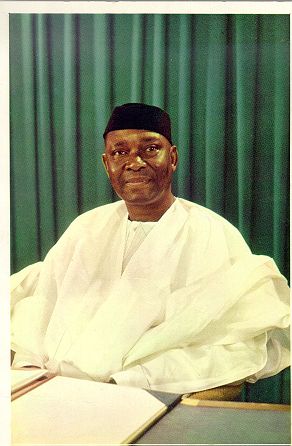Olusegun Obasanjo: Architect of Nigeria's Democratic Transition

Olusegun Obasanjo, Nigeria's fifth president, played a pivotal role in shaping the nation's political landscape. Emerging as a prominent leader after a tumultuous history of military coups, Obasanjo led Nigeria's transition from military rule to civilian governance. This article delves into Obasanjo's life, his contributions to Nigeria's democratic journey, and the key initiatives he undertook during his tenure. From his focus on democracy and economic reforms to his commitment to anti-corruption measures, Obasanjo's leadership left a lasting impact on Nigeria's development and democratic aspirations.
Early Life and Military Career: Born on March 5, 1937, in Abeokuta, Nigeria, Olusegun Obasanjo came from a modest background. He joined the Nigerian Army in 1958 and quickly rose through the ranks, displaying exceptional leadership skills. Obasanjo received military training in Nigeria and the United Kingdom and participated in peacekeeping missions across the world.
Obasanjo's prominent role in the Nigerian military culminated in his appointment as the head of state in 1976, following the assassination of General Murtala Ramat Mohammed. However, rather than clinging to power, Obasanjo recognized the need for civilian governance and embarked on a path of democratic transition.
Democratic Transition and First Presidency: Olusegun Obasanjo became Nigeria's first civilian president after the military handed over power to a democratically elected government in 1979. As president, Obasanjo focused on national reconciliation, economic development, and fostering a democratic culture. He initiated policies aimed at promoting democratic institutions, respect for human rights, and the rule of law.
Obasanjo's presidency, however, faced numerous challenges, including political unrest, economic downturns, and allegations of corruption. Despite these obstacles, he successfully completed his term, marking the first peaceful transfer of power from one civilian administration to another in Nigeria's history.
Return to Power and Second Presidency: Obasanjo's commitment to Nigeria's development and democratic progress led him back to the presidency in 1999, after winning the presidential elections. His second term in office, from 1999 to 2007, was marked by ambitious reforms and a drive for socio-economic transformation.
During his second presidency, Obasanjo pursued an agenda focused on poverty reduction, infrastructure development, and economic diversification. He implemented the National Economic Empowerment and Development Strategy (NEEDS), a comprehensive framework aimed at promoting sustainable economic growth and addressing the challenges of poverty and unemployment.
Anti-Corruption Efforts and Governance Reforms: Obasanjo's administration recognized corruption as a major impediment to Nigeria's development and worked diligently to combat it. He established the Economic and Financial Crimes Commission (EFCC) and the Independent Corrupt Practices and Other Related Offenses Commission (ICPC) to investigate and prosecute corrupt practices. Obasanjo's administration made significant strides in recovering stolen assets, strengthening financial systems, and enhancing transparency in government operations.
In addition to anti-corruption efforts, Obasanjo's administration undertook governance reforms, including the establishment of the Bureau of Public Procurement and the National Open Government Partnership. These initiatives aimed to enhance accountability, promote good governance, and create an enabling environment for investment and economic growth.
Olusegun Obasanjo's leadership in Nigeria was characterized by a steadfast commitment to democratic governance, economic development, and anti-corruption efforts. His role in leading Nigeria's transition from military rule to civilian governance set an important precedent for subsequent administrations. Despite challenges faced during his tenure, Obasanjo's reforms and initiatives laid the foundation for a more transparent and accountable Nigeria. His legacy as an advocate for democracy and socioeconomic progress continues to shape Nigeria's democratic journey and inspire future leaders in the pursuit of a prosperous and inclusive nation.


